Prema
Roopambu Brahmambu Prema Mayamu
Premanu Prema To Sandhimpa Neemamagunu
Kaana Prema Nu Poortiga Kaligiyunna
Adviteeyamu Pondaga Arhudagunu
Brahman is full of
love, the embodiment of love.
To merge that love with your love is right approach.
One who cultivates such selfless, divine love,
becomes worthy of the state of non-duality
(advaita)
Students!
Embodiments of Love!
Every being, without
exception, is a storehouse of prema. But there is
not even one who has recognized this principle of
prema! It appears as though everyone expresses
prema. Many in the world declare their love for
other people, for material objects, for wealth, for
sensual pleasures. But if we ask - for whose sake is this
love? - There is no satisfactory answer.
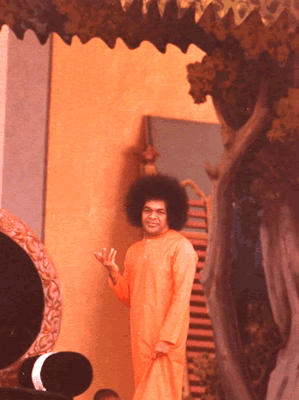
-
Wordly love is selfish
It appears as if the
mother loves the child and the child loves the mother. It
seems as though the husband and wife love each other. It
even appears that today's devotees love God. But for
whose sake do these people cultivate love? Who is loving
whom? There are no right answers forthcoming to these
questions. Why?
Everyone loves for his
own sake. No one loves for another's sake. The reason:
selfishness. Man loves objects in his own interest, not
for the sake of those objects. He loves money for his own
enjoyment, not for money's sake. People also love God for
their own petty ends, not for God. Truly, if we search
the world over, there is no person who loves God for
God's sake. There is only selfishness, selfishness,
selfishness.
Sva + artham =
svaartham, selfishness. Sva means self.
Artham means 'for the sake of'. That which is in
one's own interest is svaartham. Selfish love has
three states: love in the waking state, love in the dream
state, and love in the deep sleep state. While awake, one
lives in the world and loves with one's mind and senses.
One is able to love only with the combination of mind and
senses. Second, the dream state. In this state, senses
are forgotten and everything is created by the mind
alone. Objects, people, joys and sorrows are all
conceived by his mind. He creates even himself by his
mind. Next, in deep sleep, one experiences bliss by
merging in oneself. If we inquire along the path of
jñâna, none of these three states
provides perception of the
âtmâ.
Today we undertake many
spiritual practices. But we are not able to progress by
even a "millimeter". Why? Selfishness. Where is
selfishness born? Man is the combination of mind and
senses. Without the mind and senses, humanness cannot
exist. Humanness is characterized by the three gunas:
sattva, rajas, and tamas.
Tamas is characterized by the rule of the mind and
senses, which gives birth to ego and attachment and leads
to the joys and sorrows in human life. Next, experiencing
and observing the mind and senses and making every effort
to limit attachment and ego - this is rajas.
Ignoring the prompting of the mind and the senses, with
no expectation of the fruits of one's actions, engaging
in activity with the spirit of sacrifice and duty,
considering all as God's work, doing everything with the
view to earning God's love - these are sattvic
traits.
-
Akrura comes to Brindavanam
Such a sattvic
person was Akrura. Akrura had persevered
for countless lives to achieve divinity. He had waited
patiently for the right time and the right place to meet
God. He knew that Nârâyana had
incarnated in Brindavan and was playing there as a
cowherd boy. But for every desired objective, the factors
of time, cause, and karma must unite. It takes
time for a fruit to ripen and detach from its branch.
Akrura was a man of great wisdom and looked forward
to the right moment to meet Lord
Nârâyana.
Meanwhile,
Nârada went to meet Balarâma
and Krishna in Brindavan. "Nârâyana,
Âdi-s'esha!
I've waited long for Your darshan. Vinaasa
Kaale Vipareeta Buddhih - A contorted intellect
heralds the doom of man. With a view to destroying
You, Your maternal uncle Kamsa devised various
plans. But all his efforts have proved futile. Now his
end is imminent."
This is also total
selfishness. The idea of taking another person's life in
order to protect one's own life is a sign of an unripe
intellect. One who lets selfishness grow within invites
such demonic tendencies.
Nârada said,
"Kamsa's death is near. You are all-knowing,
all-powerful. You are Nârâyana, which
I recognized long ago. Still, some facts must be
protected without being expressed. Men are not able to
recognize You. This depends on the karma and
deservedness of each person. With whatever attitude
people think of You, You assume that form for them. This
is a truth not known to everyone. You fulfill whatever
they desire of You. As is a person's mind, so is the
result they experience. So Lord, give me leave now.
Tomorrow, Your magnificent power will be known the world
over. I will see You again during the coronation of your
grandfather, Ugrasena." With beautiful smiles,
Balarâma and Krishna bid
Nârada farewell.
The very next day,
Akrura proceeded to Brindavan in his chariot.
Akrura was a great devotee. "No matter how demonic
Kamsa may be, he granted me this chance of meeting
the divine Krishna. I am grateful to
Kamsa", thought Akrura to himself. Akrura
entertained pure feelings even toward demons. He reached
Brindavan at dusk. His chariot came to a halt in front of
Nanda's house. He went inside but found that
Balarâma and Krishna were not home.
They had gone to the forest with their cows [S.B.
10.38].
Balarâma
and Krishna returned in a few minutes.
Akrura's eyes rested on them. He was spellbound.
This was his first time seeing them. He was mesmerized by
their brilliance, lotus eyes, and bewitching smiles. He
felt an instant attraction to them. He contemplated on
Nârâyana within himself and couldn't
find words to greet Krishna. Krishna, the
all-knowing One, asked him many times, "Akrura, o
Akrura! For what reason have you come?"
Akrura said,
"Krishna! Kamsa has initiated a yaga
called Dhanur
Yaga. He has
sent me to fetch You. This is the partial truth. To speak
the whole truth in front of God is my bounden duty. The
Dhanur Yaga is an excuse for Kamsa to
summon You to Mathurâ. Kamsa plans to kill
You there and rule undisputed forever after. Each person
has a different feeling toward You."
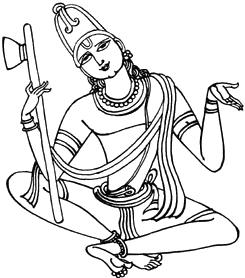 The
saint Annamâcârya sang,
The
saint Annamâcârya sang,
'Enta Maatramuna Evaru Talachina, Anta Maatrame
Neevu' -
'Whatever form and attitude You are pictured with, You
assume that form.'
"If people think of You
as a man, You behave as a man. If they consider You
divine, You appear as God. This multiplicity is not in
You but in human attitudes. Krishna, get ready to
go to Mathurâ." Then Akrura turned to
Nanda and invited him also. Kamsa had
invited Nanda and other village chiefs for the
Dhanur Yaga also.
Some texts say that
Nanda and Yas'odâ were fearful about
sending Krishna to Mathurâ. This is
not true. Nanda and Yas'odâ had witnessed countless
instances of Krishna's divinity. They had seen
Krishna destroy Kamsa's mighty demons
[S.B.
10.6, 10.7, 10.11, 10.12,
10.15, etc].
They were present when He danced on the hood of the
serpent Kâliya [S.B.
10.16, 17, 18 & 19]
and subdued it. They knew that Balarâma and
Krishna could never face danger. All victories wed
only God, and they knew Krishna was
God.
Nanda had an
announcement made in Vrindâvana that
evening: "King Kamsa is conducting a Dhanur Yaga in
Mathurâ. Those who wish to witness the festivities
may accompany me." Many families got ready with
chariots, horses and carts, as per their capacity. It was
a joyous occasion for everyone - everyone except the
gopikas.
-
The Grief of Gopikas and Gopalas
 Of
course, no one can harm Krishna, the Lord Himself. This
wasn't the concern of the gopikas. Their worry
was: Will Krishna return to Brindavan once He
leaves? All the gopikas and gopalas
convened a meeting to prevent Krishna from
leaving! They made a human chain circling Nanda's
house. Nanda, and Yas'odâ pleaded
with them not to obstruct the plans, but the
gopikas and gopalas could only cry
piteously in justification. "Krishna! Râma!
You cannot go to Mathurâ! What will become
of us? Brindavan will become a barren wasteland. Everyone
here will become lifeless. The green beauty of Brindavan
will be lost forever. Don't leave!"
Of
course, no one can harm Krishna, the Lord Himself. This
wasn't the concern of the gopikas. Their worry
was: Will Krishna return to Brindavan once He
leaves? All the gopikas and gopalas
convened a meeting to prevent Krishna from
leaving! They made a human chain circling Nanda's
house. Nanda, and Yas'odâ pleaded
with them not to obstruct the plans, but the
gopikas and gopalas could only cry
piteously in justification. "Krishna! Râma!
You cannot go to Mathurâ! What will become
of us? Brindavan will become a barren wasteland. Everyone
here will become lifeless. The green beauty of Brindavan
will be lost forever. Don't leave!"
This was also
selfishness! In the interest of keeping Krishna's
company, they did not mind foiling Krishna's plans!
Balarâma and Krishna smiled and told
them, "We also have some selfishness of our own! Our Will
must be fulfilled. The objective for which we assumed
human forms must be attained, O gopikas and
gopalas! It is every man's duty to fulfill the
purpose for which the body is given. We must go to
Mathurâ. There is no other way." The gopikas
and gopalas were drowned in sorrow. They had to admit
that keeping Krishna in Brindavan was an act of
selfishness on their part.
The gopikas said,
"We do not desire any worldly ends. We want You for our
mental satisfaction. People desire various things from
You. We pray to You for You." Then Krishna began to teach
them jñâna.
"You say 'my'
satisfaction. Who is this 'I'? Are you the body? Or
the mind? No, no. You are neither the body nor the
mind. The body is inert, a collection of the five
elements. The mind is fickle. The Indweller,
âtmâ makes the body and mind
function. A director pulls on the strings of puppets.
He makes the puppets play together for a while and
then separates them. Who are these puppets? Mind and
senses. The mind and senses function together. Then
the mind leaves the senses, and the senses leave the
mind. And finally, both of them leave the body. What
is that which never leaves, never perishes? The
âtmâ alone. That is the real 'I'. Man
is able to say 'I' by the prompting of the
âtmâ, but he identifies it with the
body. This submerges him in ego and attachment.
Therefore, the One who exists in you is 'I'. The One
in me is 'I' also. Ekovasi Sarva Bhoota Antaraatma
- The One God exists in all beings. So, do not
feel sad. Recognize these truths about the
âtmâ, which will reveal all
secrets. In this world, results of past actions must
be experienced. The body may collapse at any moment.
But it is man's duty to strive for well-being when
disease attacks the body. Similarly, the world is
plunged in disease today. Men's bad thoughts and
actions are the cause. To destroy this pervasive
unrighteousness, we must go to Mathurâ."
 Explaining
to the gopikas and gopalas in this manner,
Krishna and Balarâma entered their house. They
collected their luggage for the journey and came out.
They had packed all their articles the previous day.
Akrura sat behind the horses, holding the reins of the
chariot. Despite the jñâna they had
just heard, the gopikas and gopalas could not transcend
their ego and attachment. They blocked the path to the
chariot. Akrura was their elder and elders should
not be disrespected. The gopikas and gopalas knew that.
But their love for Krishna overpowered such
formalities.
Explaining
to the gopikas and gopalas in this manner,
Krishna and Balarâma entered their house. They
collected their luggage for the journey and came out.
They had packed all their articles the previous day.
Akrura sat behind the horses, holding the reins of the
chariot. Despite the jñâna they had
just heard, the gopikas and gopalas could not transcend
their ego and attachment. They blocked the path to the
chariot. Akrura was their elder and elders should
not be disrespected. The gopikas and gopalas knew that.
But their love for Krishna overpowered such
formalities.
They saw Krishna
and Balarâma emerge from the house with
luggage. They panicked and cried loudly, "Please don't
leave! How can we live? Take us with You!" They pleaded
in many ways, even using harsh words on Akrura.
Balarâma and Krishna did not want to
prolong their agony. They walked slowly to the chariot,
smiling, blessing and consoling all the time. This
incident caused a few hours of delay. They could not
reach Mathurâ at the intended time.
-
Akrura Experiences Krishna's Omnipresence
By dusk they reached the
banks of the river Yamunâ. Akrura had
to perform Sandhya
Vandanam. He
instructed Balarâma and Krishna to wait in the
chariot and went to the river. While praying, when Akrura
dipped his head into the water, he saw a vision of Lord
Nârâyana reclining on
Âdi-s'esha. He perceived the forms of
Krishna and Balarâma as Nârâyana and
Âdi-s'esha. He was confused and lifted his head
out of the water. Krishna and Balarâma were in the
chariot, conversing animatedly. Akrura told himself,
"What a fool I am! How can I limit the Lord? Is He not
everywhere?" This was the grace earned by him. Until the
devotee reaches a lofty state, he cannot appreciate God's
omnipresence.
Akrura silently returned
to the chariot and took his place. Krishna asked him most
unassumingly, "Akrura, your face is so radiant! What
happened? Did you see or experience anything
extraordinary? Tell us!" Akrura said, "Krishna, My Lord,
don't You know? I saw You." Krishna casually responded,
"I see, you have recognized Me at least now" and
instructed that the chariot proceed to Mathurâ
[see S.B.
10.39].
-
On the Streets of Mathurâ
They reached
Mathurâ at night. Balarâma and
Krishna told Akrura, "Tomorrow is the Dhanur
Yaga. So we will not come to your house tonight."
Akrura pleaded, "Where else will you spend the night,
Swami? Please be gracious enough to accept my
invitation." Krishna said, "It is not right for us to
come now. You are the messenger of Kamsa today. It
is not proper for Me to accept the hospitality of a
messenger. This is contrary to the guidelines of
diplomacy." [S.B. 10.41]
By that time, all the
Brindavanam people had gathered in Mathurâ with
Krishna and Balarâma. They wanted to
visit the poor couple, Devakî and
Vasudeva, who were still in jail. Krishna and
Balarâma could have gone to see them. But they did
not. They had to set an example to the world and teach
the ideal: Maatru Devo Bhava, Pitru Devo Bhava -
Mother and father are equal to God. This is God's
primary teaching in all ages. People might wonder: Why
did Krishna not go to see His parents soon after arriving
in Mathurâ? No. Balarâma and Krishna had
resolved to kill Kamsa and only then see their
parents - not just see them, but free them from prison.
Krishna spent the night in the same house where
Nanda and others camped.
At dawn, Krishna and
Balarâma roamed around Mathurâ. They looked
like lion cubs - beautiful and majestic. The entire city
came to know of their presence in a matter of moments. As
the two brothers walked the streets of Mathurâ,
men, women and children drank their darshan from
rooftops, windows ... everywhere. Everybody thought, "Our
lives are redeemed. What more can we ask for? Since long
we desired to behold Balarâma and
Krishna. We are indebted to Kamsa." Krishna
and Balarâma did not even go home till
evening.
-
The Washerman and the Perfume-Woman
Krishna and
Balarâma reached the main gate of Kamsa's palace.
The yaga was to begin the following day. A
washerman was about to enter the gate. He had a load of
Kamsa's best silks, cleaned specially for the function.
Balarâma asked him, "Hey, what is that bundle you
have?" Krishna said, "Why ask? Go see for yourself." The
washerman said, "These are the King's costly silks. You
seem to be villagers. You are not fit to even touch these
clothes! Be gone!" Krishna heard this and gave a
tight-fisted blow to the washerman [S.B.
10.41].
Both the washerman and his bundle fell down.
Krishna opened the bundle and collected clothes
for Himself and for His elder brother. The soldiers at
the gate witnessed this scene and informed
Kamsa.
Meanwhile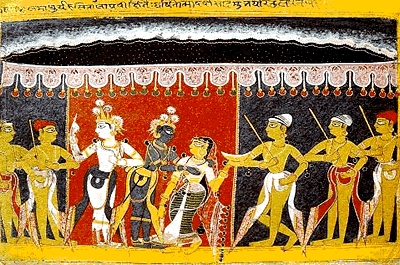 ,
as Balarâma and Krishna were about to proceed after
adorning themselves in these silks, a lady approached the
gate. Her name was Kubja [Trivakrâ
-'three-bend]. Her face was beautiful but her body
was crooked in three places. She was carrying perfumes
and pastes. She raised her head and saw the brothers. She
thought, "Are these the sons of Devakî
and Vasudeva? They appear to be Avatars of
Lord Nârâyana. Truly, that demon
Kamsa is not worthy of my perfumes. How nice it
would be if these children accepted them!"
,
as Balarâma and Krishna were about to proceed after
adorning themselves in these silks, a lady approached the
gate. Her name was Kubja [Trivakrâ
-'three-bend]. Her face was beautiful but her body
was crooked in three places. She was carrying perfumes
and pastes. She raised her head and saw the brothers. She
thought, "Are these the sons of Devakî
and Vasudeva? They appear to be Avatars of
Lord Nârâyana. Truly, that demon
Kamsa is not worthy of my perfumes. How nice it
would be if these children accepted them!"
With a full heart, she
humbly went to Krishna, "Son, here are my perfumes
and rose water, prepared with care. No one knows the
secrets of these preparations besides me. There are many
people selling perfumes in Mathurâ but the King
accepts only mine. Please accept these perfumes."
Krishna dipped His hand into her boxes and dabbed
His clothes here and there, only for Kubja's
satisfaction. Kubja said, "For having lived this long,
for having taken up this profession, my life is redeemed
today. All these years I offered my perfumes to the demon
Kamsa. Today I served the Lord." Shedding copious tears,
Kubja expressed gratitude to them. Then she stepped aside
with the intention of going her way. Krishna stopped her.
"You have granted us these perfumes. In return, I am
bound to give you something. I never take anything from
anyone without reason. But whatever I take, I return a
thousand-fold." [see for this story S.B.
10.42]
-
Offer Something to God
God never asks anything
from anyone. But when people give to Him with a full
heart, He returns a thousand-fold. You know the story of
Kuchela.
For the gift of a fistful of dry rice, Krishna
granted him lifelong prosperity. Rukminî
devî was able to win Krishna for herself by
offering Him just a single tulasî
leaf. So, whenever God accepts anything from anyone, He
grants unending bounty in return.
That is why it is said,
Patram Pushpam Phalam Toyam [B.G.
9: 26] - A
leaf, a flower, a fruit or some water - At least
these must be offered to God. Why? Only when we offer, we
become eligible to receive. If you go to a bank and
simply ask for your money, they will not give it to you
although you haveevery right over it. You need to fill a
withdrawal slip and sign it. Only then can you claim your
money. So, you must give something first, in order to
receive - This is Divine Law. Even if it is tiny or
insignificant, it must be offered to God.
So Krishna said,
"O Kubja! Wait, wait. For your perfumes gifted to
us with a pure heart, I must return the favor." Krishna
went close to her and she could not fathom His
intentions. Krishna pressed Kubja's feet
with His tiny feet. He put His hand under her chin and
lifted her. The bends in her body became straight!
Kubja thought, "He has granted me a beautiful body
in keeping with my beautiful face. He is Lord
Nârâyana!" She offered all her
perfumes to Krishna and said, "Lord, please come
to my house and let me serve Your Lotus Feet."
Krishna gave His word, "After I fulfill My task
in Mathurâ, I shall certainly visit your
house." [S.B. 10.48]
-
The End of Kamsa
The next day, these two
lions strode along the streets. As they approached the
Dhanur Yaga, the grandeur of the cosmos seemed to
be reflected in their faces. Whoever set their eyes on
them could not stop looking at them. People forgot
themselves, gazing at the beautiful forms of Krishna
and Balarâma.
Balarâma and
Krishna reached the main gate. A mad elephant was
stationed there, specially to stop them. All watched with
bated breath. They were anxious that the elephant might
trample upon the boys any moment. Trumpeting ferociously,
the elephant charged at Balarâma and
Krishna. It lifted its huge feet off the ground and
attempted to crush them. Krishna and
Balarâma were tiny, only five years old!
They ran between the elephant's legs and confused it.
Then Balarâma caught one leg and
Krishna, another. They whirled the elephant around
and dashed it against the ground, much like a washerman
beats clothes on a rock. The elephant gave up its life
[see S.B.
10.43]. Kamsa
was informed that his most ferocious elephant had failed
to stop Krishna. His fear increased from moment to
moment.
As Krishna and
Balarâma proceeded into the grounds, two men
accosted them. They were Cânûra and
Mushtika, Kamsa's prize wrestlers, under orders to do
away with the two boys. Krishna and
Balarâma looked at them and said, "Are YOU
going to fight us? O foolish men, you are like mosquitoes
desiring combat with an elephant! Mosquitoes!"
Cânûra and Mushtika could not
bear this insult. They jumped upon the tiny boys in fury.
Krishna and Balarâma gave them just
one blow with their fists and the wrestlers were rendered
lifeless. However, they recognized the brothers as divine
and had Lord Nârâyana's darshan
just before they died [see S.B.
10.44].
Krishna and Râma
proceeded forward. The Dhanur Yaga was in
progress. Many kings, chiefs, and citizens had gathered
to witness it. Kamsa was seated on a vast, raised
platform built especially for him. Balarâma
and Krishna walked to the center of the
grounds fearlessly, with the gait of lions. Kamsa
appeared strong outwardly but his heart became weaker as
Krishna got closer. Kamsa's body began shivering and
shaking. Many people thought, "Look at the King! He is so
angry that his body shakes in fury!" In reality, Kamsa's
body was shaking not out of anger but out of fear! Yat
Bhavam Thath Bhavati - as is the feeling, so is
the result. Kamsa's wickedness alone made him
experience fear now. This is also called "guilty
conscience".
Kamsa's entire army was
arrayed around him to guard him against Krishna's
approach. But Balarâma and Krishna ignored
Kamsa. They walked straight towards the Dhanus -
the Divine Bow - kept at the center of the enclosure. No
one could budge the bow, what to talk of lifting it.
Krishna casually held it with his left hand and
lifted it as if it was a feather. As He bent the bow to
tie its string, the bow snapped in His arms. The sound
was deafening, like a bomb. All were terrified [see
S.B.
10.42].
At that time,
Nanda was approaching Kamsa to pay taxes
collected from Brindavan. Other village chiefs were doing
the same. Nanda's eyes followed Krishna's
every action. He looked forward to more of His exploits.
He was not worried because he knew that the brothers were
divine. The divine bow, the focus of the yaga, was
broken. Kamsa rose from his throne, and the whole
assembly rose with him. Kamsa ordered his army to destroy
Krishna and Balarâma. Kamsa was
heavily built. Krishna and Balarâma were tiny and
agile. Like baby deer, they ran between the legs of the
intervening soldiers! Reaching the dais, both of them
jumped upon Kamsa. They caught hold of Kamsa's
hair, pulled him to the ground and put an end to him. It
was all over in moments. Everyone was stunned speechless.
Of course, the heavenly prophecy was bound to come true.
They recognized Krishna as Nârâyana
and bowed down with folded hands.
-
The Reunion with Parents
Without wasting any time,
Krishna and Balarâma hurried to Kamsa's dungeons.
They fell at the feet of Devakî and Vasudeva
[S.B. 10.44].They
freed them from shackles and brought them out into the
open. Then they went to the cell where Ugrasena
had been imprisoned by Kamsa. They freed him also and
brought him to the yaga hall. With his son's dead
body lying there, Ugrasena was crowned as King of
Mathurâ. After the coronation,
Yas'odâ, Nanda, Devakî, Vasudeva, and
Rohinî - all hugged Balarâma
and Krishna. All three mothers were there. All of
Brindavan was there, except the gopikas. There was
no limit to their happiness and excitement.
Devakî took Krishna and
Balarâma into the palace and said, "Sons, I
could not witness Your childhood, but only hear of Your
exploits and pranks from others. How unfortunate I am! I
could not see You kill the demoness
Pûtanâ. When Yas'odâ
wanted to tie You to a rock, no length of rope was enough
to go around Your stomach - so I have heard. I gave You
birth, but all the fun and frolic with You belonged to
Yas'odâ. You are called 'son of
Yas'odâ'. How blessed she is! Though I have
children, I am as good as childless."
Balarâma
and Krishna consoled their parents and granted
them unlimited happiness through loving words.
"Past is past.
Do not grieve. From now, we are always with you. You
will experience all possible bliss in our company. Yoy
know we are not ordinary boys. We will bring the whole
world within our control. I gave you darshan soon
after My birth - Preserve that vision in your heart.
Visualize it outside you also. Antar Bahischa Tat
Sarva Vyaapya Nârâyana Sthitah - God
is inside, outside, everywhere. Decrease your
attachment to the body. Strengthen your bond to the
âtmâ. Attachment is the root cause
of sorrow. You suffered in prison because you were
attached to your sons. Understand that we are not
ordinary, that we are God. Recognize the reality of
your sons."
In this manner,
Krishna and Balarâma consoled their
mother tenderly and taught her the truth.
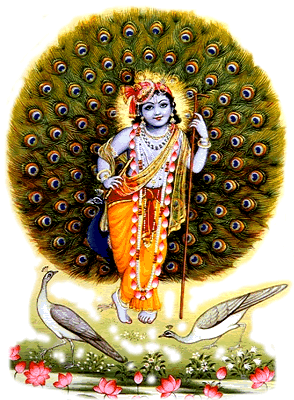
-
Akrura's devotion
After Kamsa's death,
Krishna went to Akrura's house. He had
given His word. The Lord never goes back on His promise.
Akrura told Krishna, "Swami! I doubted if You had pity on
me. You killed Kamsa without any leniency, although he
was Your uncle. You have no trace of attachment. We are
attached to You, but You are attached to no one. All are
equal to You, all are Your relatives. I have recognized
this truth about You today. You killed Tkataki,
although she was a woman. You asked King Bali
for alms. He surrendered everything to You. And look what
You did. You pressed him into the nether worlds with Your
Feet! My mind was confused. How could such a strict Lord
ever feel kindness and pity toward me? After all, who am
I?"
In this manner,
Akrura ran to Krishna and embraced Him
tightly as soon as He entered his house. Akrura
was a highly purified soul. He was completely
sattvic in character. Kamsa also knew this
truth. That is why Kamsa hand-picked Akrura
for the task of inviting Krishna to
Mathurâ. Kamsa realized that Krishna
and Balarâma would never come to
Mathurâ if they were invited by anyone
besides Akrura. Akrura's heart was so pure that
God could never refuse him anything.
People who are not
familiar with the Bhâgavatam consider
Akrura to be an ordinary man, or a cruel man. No,
no. Akrura was the embodiment of purity. He had no
bodily attachment. He considered everything as God's
property and acted as per the Divine command. He had no
trace of attachment, even to his wife and children. He
contemplated incessantly on Lord
Nârâyana. Understand the character of
such pure devotees and acquire their
qualities.

Bhagavân
concluded with the bhajan
"Govinda Krishna Jay, Gopala Krishna Jay, Gopala Bala
Bala Radha Krishna Jay"

click
to listen
Also
watch Swami singing this bhajan
here
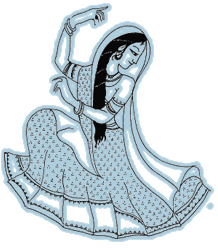
Dhanur
Yaga: [Dhanur-dhâri = Archer, bearer of a
bow] ritual, ceremony, sacrifice or rite; the
ceremony of lifting the sacred bow. [see
S.B.
10.42]
Sandhya Vandanam:
Daily prayers done at sunrise, noon and sunset.
Nârâyana: (path
of man, God of man, son of the original man):
Vishnu-tattva-avatâra He in whom all reside. Is
presented with four arms as the one resisting worldly
temptations in the holding out of heavenly beauties (see
Vishnu).
- Plenary expansion of Krishna with four hands, holding
the conch, the disc, the mace and the lotusflower.
- Lord of the heavenly worlds, the Vaikunthha
planets.
- Name of the Supreme Personality of God, He who is the
source and destination of all living beings (Vishnu and
purusha).
- The part (or lead) of God relating to man, that source
from which the waters originated. (S.B.
10.14: 14).
- Monier Williams dictionary: 'the son of the original
Man with whom he is generally associated; he is
identified with Brahmâ, with Vishnu or Krishna; the
Apsara Urvas'i is said to have sprung from his thigh;
elsewhere he is regarded as Kas'yapa or Angirasa, also as
chief of the Sâdhyas, and with the Jains as the
eigth of the nine black Vâsudevas; the Purusha-hymn
is said to have been composed by Him....'
- Sage Nârâyana: for the welfare, in this and
the next life, of the human beings abiding in dharma,
jñâna and self-control in
Bhârata-varsha, has he been performing penances
from the beginning of Brahmâ's day (see
10.87:
6).
Âdi-s'esha: ('the
secondary from the beginning') also S'esha-nâga or
Ananta-s'esha: the snakebed of
Garbhodakas'âyî Vishnu. Represents the
secondary matter in the service to Krishna. Portion of
Sankarshana and is sometimes also so named (see
S.B.
5.25).
Kuchela (or Sudama): He was
Krishna's friend at school. Years later, as a
householder, Kuchela was very poor. He visited Krishna
and took a fistful of dry rice, recalling His childhood
liking for it. However, awed by Krishna's royal stature,
Kuchela hid his humble gift. Krishna, the All-Knowing,
grabbed the soiled bundle and ate the plain rice with
relish. When Kuchela returned home, he found that his hut
had become a palace, and his family was living in
abundance [see S.B. 10.80
& 10.81].
Satyabhâmâ, a
wife of Krishna, wanted to "buy" Him for herself with her
wealth. However, no matter how much gold she heaped on
one pan of a weighing balance, Lord Krishna, sitting in
the other pan, proved heavier. Then, Rukminî,
Krishna's first wife, put a single talasî leaf on
one side of the balance, with devotion. The leaf balanced
Krishna's weight, thereby humbling
Satyabhâmâ's pride.
Thataki: A demoness killed by
the Râma avatâra [see
Ramakatha
Rasavahini, ch. 6b]
Bali: The King of demons, humbled
by Vâmana avatâra.
[see
S.B. 8.21]
Paintings:
The two paintings of Krishna and Balarâma leaving
Vrindâvana with Akrura and the gopis stopping Him
are by Indra Sharma; also the painting of
Krishna with peacock at the bottom (slightly worked on)
is by him.
![]()
![]()

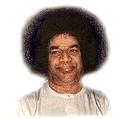
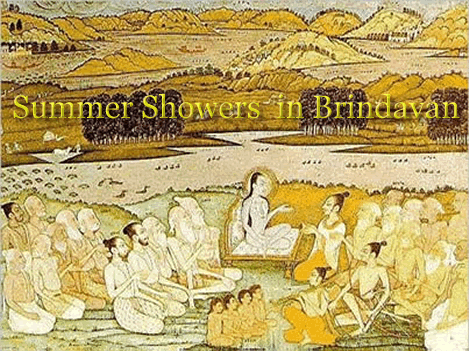



 The
saint Annamâcârya sang,
The
saint Annamâcârya sang,
 Explaining
to the gopikas and gopalas in this manner,
Krishna and Balarâma entered their house. They
collected their luggage for the journey and came out.
They had packed all their articles the previous day.
Akrura sat behind the horses, holding the reins of the
chariot. Despite the jñâna they had
just heard, the gopikas and gopalas could not transcend
their ego and attachment. They blocked the path to the
chariot. Akrura was their elder and elders should
not be disrespected. The gopikas and gopalas knew that.
But their love for Krishna overpowered such
formalities.
Explaining
to the gopikas and gopalas in this manner,
Krishna and Balarâma entered their house. They
collected their luggage for the journey and came out.
They had packed all their articles the previous day.
Akrura sat behind the horses, holding the reins of the
chariot. Despite the jñâna they had
just heard, the gopikas and gopalas could not transcend
their ego and attachment. They blocked the path to the
chariot. Akrura was their elder and elders should
not be disrespected. The gopikas and gopalas knew that.
But their love for Krishna overpowered such
formalities. ,
as Balarâma and Krishna were about to proceed after
adorning themselves in these silks, a lady approached the
gate. Her name was Kubja [Trivakrâ
-'three-bend]. Her face was beautiful but her body
was crooked in three places. She was carrying perfumes
and pastes. She raised her head and saw the brothers. She
thought, "Are these the sons of Devakî
and Vasudeva? They appear to be Avatars of
Lord Nârâyana. Truly, that demon
Kamsa is not worthy of my perfumes. How nice it
would be if these children accepted them!"
,
as Balarâma and Krishna were about to proceed after
adorning themselves in these silks, a lady approached the
gate. Her name was Kubja [Trivakrâ
-'three-bend]. Her face was beautiful but her body
was crooked in three places. She was carrying perfumes
and pastes. She raised her head and saw the brothers. She
thought, "Are these the sons of Devakî
and Vasudeva? They appear to be Avatars of
Lord Nârâyana. Truly, that demon
Kamsa is not worthy of my perfumes. How nice it
would be if these children accepted them!"

